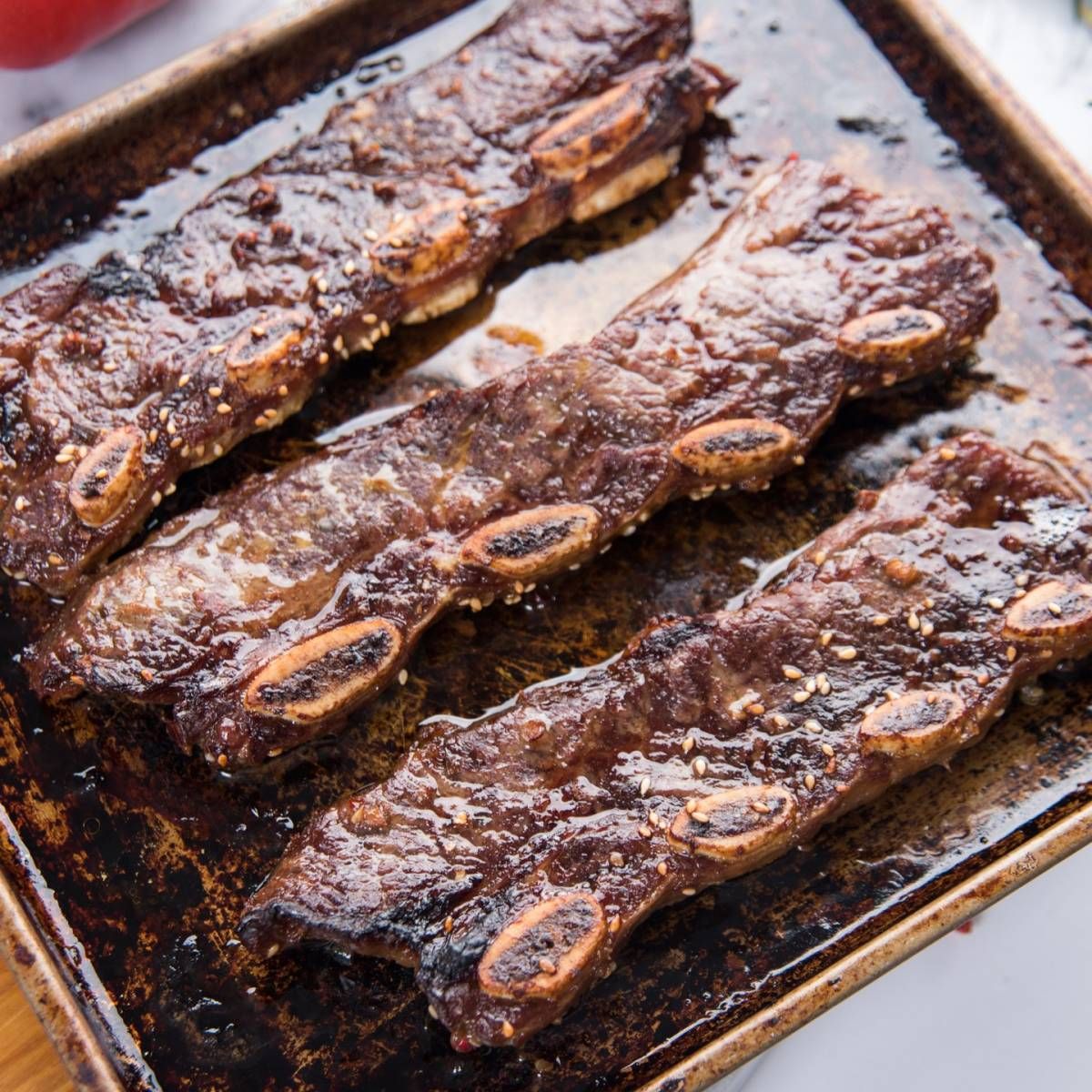Short Ribs Recipe are a popular cut of beef known for their rich flavor and tender meat when cooked properly. They are incredibly versatile, lending themselves to various cooking methods and a staple in many global cuisines. Whether you are a novice cook or an experienced chef, mastering short ribs can elevate your culinary skills and impress at any meal.
Choosing the short ribs recipe
Selecting the right short ribs is crucial for ensuring flavorful and tender results. Here are detailed tips to help you pick the best short ribs:
- Marbling: Look for ribs with good fat marbling. Fat marbling is key to flavor and tenderness, as the fat melts during cooking, naturally basting the meat.
- Meat Quality: Opt for ribs that have a bright red color and moist, not dry or brittle, bones. The freshness of the ribs significantly impacts the final taste.
- Cut Type: Understand the cuts available:
- English Cut: Cut parallel to the bone, typically thicker and ideal for braising.
- Flanken Cut: Sliced across the bone, thinner, perfect for quicker cooking methods like grilling.
For more insights on selecting the perfect cut, explore our detailed guide to New York Strip Steak, which also applies to choosing quality short ribs.
Preparing Short Ribs for Cooking
Proper preparation is key to maximizing the flavor and texture of short ribs. Here’s how to prepare your ribs for cooking:
- Trimming: Trim excess fat to manage greasiness without compromising flavor, retaining enough to enrich the dish.
- Marination: Enhance depth of flavor with a marinade. Classic ingredients include soy sauce, garlic, and fresh herbs. Marinate for at least a few hours, or overnight if possible, to allow the flavors to penetrate deeply.
- Tenderizing: For tougher cuts, consider a tenderizing marinade that includes natural enzymes found in kiwi, pineapple, or papaya.
Explore creative marination and preparation techniques with inspiration from our Chipotle Chicken recipes, adaptable for robust dishes like short ribs.
Braised Short Ribs Recipe
Enjoy the rich flavors and tender meat of braised short ribs with this detailed recipe. Perfect for a cozy dinner, these ribs are slow-cooked to perfection, offering a melt-in-your-mouth texture paired with a savory sauce.
Ingredients
- 4 pounds of beef short ribs
- 2 tablespoons of olive oil
- Salt and freshly ground black pepper, to taste
- 1 large onion, chopped
- 3 cloves of garlic, minced
- 2 carrots, peeled and chopped
- 2 celery stalks, chopped
- 1 tablespoon of tomato paste
- 1 bottle (750 ml) of dry red wine
- 2 cups beef broth
- 2 bay leaves
- A few sprigs of fresh thyme
- Fresh parsley, chopped (for garnish)
Step-by-Step Instructions for Short Ribs Recipe
- Prep the Ribs: Start by trimming the short ribs of any excess fat. Season generously with salt and pepper.
- Brown the Ribs: In a large Dutch oven or heavy-bottomed pot, heat the olive oil over medium-high heat. Add the ribs and sear them until browned on all sides, about 3-4 minutes per side. Remove the ribs and set aside.
- Sauté the Vegetables: In the same pot, add the onion, carrots, and celery. Cook over medium heat until the vegetables are softened, about 5 minutes. Stir in the garlic and cook for another minute until fragrant.
- Deglaze the Pot: Add the tomato paste and cook for a minute before pouring in the red wine. Bring to a simmer and let the wine reduce by half, scraping up any browned bits from the bottom of the pot.
- Braise the Ribs: Return the ribs to the pot. Add the beef broth, bay leaves, and thyme. Bring the mixture to a boil, then reduce the heat to low, cover, and simmer gently for about 2-3 hours, or until the ribs are very tender.
- Finish the Dish: Remove the bay leaves and thyme sprigs. Transfer the ribs to a serving platter. Skim off any excess fat from the surface of the sauce, then season the sauce with salt and pepper to taste. Spoon the sauce over the ribs and garnish with chopped parsley.
Nutritional Facts (per serving)
- Calories: 600
- Total Fat: 40g
- Saturated Fat: 18g
- Cholesterol: 150mg
- Sodium: 340mg
- Total Carbohydrates: 8g
- Dietary Fiber: 1g
- Sugars: 2g
- Protein: 50g
Note: Nutritional values are approximate and can vary based on the exact ingredients used and portion sizes.
Cooking Methods for Short Ribs Recipe
Short ribs flourish under various cooking methods, each imparting unique flavors and textures:
- Braising: The quintessential method for short ribs, braising involves searing the meat and then slowly cooking it in a flavorful liquid at low temperatures. This method is perfect for transforming tougher cuts into fork-tender delicacies.
- Slow Cooking: Ideal for convenience, slow cooking allows you to set up your meal hours in advance and return to beautifully cooked ribs.
- Grilling: Quick and imparting a smoky flavor, grilling is fantastic for flanken cut ribs. Ensure the ribs are marinated well and watch them closely on the grill to prevent overcooking.
- Instant Pot: For those seeking speed without sacrificing tenderness, the Instant Pot can significantly reduce cooking time while still delivering excellent results.
Recipes
Delve into these detailed short rib recipes that cater to a variety of tastes and occasions:
- Classic Braised Short Ribs: This recipe uses a rich red wine and beef broth base, slow-cooked with onions, carrots, and herbs to create a succulent, deeply flavorful dish.
- Korean Style Short Ribs (Galbi Jjim): Marinated in a blend of soy sauce, sugar, sesame oil, and garlic, then grilled to caramelized perfection.
- BBQ Short Ribs: These are slathered in a homemade barbecue sauce and slow-cooked until they effortlessly fall off the bone.
How Long Should You Cook Short Ribs to Maximize Tenderness?
One common question among both novice and experienced cooks is whether short ribs become more tender the longer they are cooked. The answer is a resounding yes, but there’s a bit more to it that’s crucial for achieving that perfectly tender, fall-off-the-bone meat.
The Science Behind Tender Short Ribs
Short ribs are known for their rich flavor and marbling, but they also contain a significant amount of connective tissue. This tissue, made up of collagen, can make the meat tough if not cooked properly. However, when short ribs are cooked slowly at a low temperature, the collagen breaks down into gelatin through a slow and gentle simmering process. This transformation not only tenderizes the meat but also enriches the cooking liquid with body, giving you a sauce that’s as flavorful as the meat itself.
Best Methods for Tenderizing Short Ribs
- Braising: This is perhaps the most popular method for cooking short ribs. By searing the ribs first and then cooking them slowly in a flavorful liquid (such as wine, broth, and herbs), you allow the ribs to tenderize over several hours. Cover the pot and keep the heat low enough to maintain a gentle simmer. The key here is patience; the longer you let the ribs cook, the more tender they will become.
- Slow Cooking: Using a slow cooker is another excellent way to ensure your short ribs come out tender. The consistent low heat allows you to set it in the morning and come home to deliciously tender ribs without having to watch the pot.
- Pressure Cooking: For those who need tender ribs in a fraction of the time, pressure cooking is an effective shortcut. While it’s quicker, the high pressure still breaks down the collagen in the meat, rendering it tender and juicy.
Tips to Keep in Mind
- Ensure the ribs are submerged in the cooking liquid for even cooking and flavor absorption.
- Avoid cooking on too high heat, as this can cause the meat to become tough and chewy instead of tender.
- Allow the cooked ribs to rest in their juices after cooking to redistribute the moisture throughout the meat.
How to Properly Prep Short Ribs for Cooking
Preparing short ribs correctly is key to maximizing their flavor and tenderness in any dish. Here’s a step-by-step guide on how to prep your short ribs before cooking:
1: Selecting Your Ribs
When buying short ribs, look for cuts with a good amount of marbling and meat. Ribs that have too much fat may end up greasy, while those with too little might dry out during cooking.
2: Trimming the Fat
- Trim Excess Fat: While some fat is desirable for flavor and moisture, too much can overpower the dish. Trim off any large, thick pieces of fat that won’t render down during cooking.
- Remove Silver Skin: This tough membrane on the meat doesn’t break down during cooking and can make the ribs chewy. Gently slide a knife under the silver skin and peel it away.
3: Cutting the Ribs
- Decide on the Cut: If your ribs haven’t been pre-cut, you may choose between English cut (cut parallel to the bone, typically thicker) and Flanken cut (sliced across the bone, thinner). The cut you choose will influence your cooking method and time.
4: Marinating (Optional but Recommended)
- Create a Marinade: To infuse the ribs with more flavor, prepare a marinade. Common ingredients can include soy sauce, garlic, vinegar, and herbs. For a simple marinade, mix these ingredients in a bowl.
- Marinate the Meat: Place the ribs in a large zip-top bag or a shallow dish and pour the marinade over them. Ensure all pieces are well-coated. Refrigerate and let them marinate for at least a few hours, or overnight for deeper flavor.
5: Bringing to Room Temperature
- Temper the Ribs: Before cooking, let the ribs sit out at room temperature for about 30 minutes. This step helps them cook more evenly.
Serving and Presentation
Presentation is nearly as important as preparation. Here’s how to serve your short ribs to enhance their appeal:
- Starches: Serve with mashed potatoes, creamy polenta, or fluffy rice to soak up the rich sauces.
- Vegetables: Balance the richness with steamed greens or a crisp garden salad.
- Wine Pairing: Complement the meal with a robust red wine, such as a Cabernet Sauvignon, which pairs wonderfully with the hearty flavors of beef short ribs.
Frequently Asked Questions
- How long should I cook short ribs?
Cooking time varies by method, but typically, braise in a preheated 325°F (163°C) oven for 2-3 hours. - Can short ribs be cooked from frozen?
For best results, thaw short ribs in the refrigerator overnight before cooking to ensure even heat distribution. - What are the best spices and herbs for Short Ribs Recipe?
Rosemary, thyme, and garlic are excellent choices that complement the natural flavors of beef.
Additional Tips and Tricks
- Advanced Preparations: Marinate your short ribs a day ahead to deepen the flavors and tenderize the meat.
- Reheating: Reheat leftovers slowly in a covered dish in the oven to preserve moisture.
- Storage Tips: Properly stored, cooked short ribs can last in the refrigerator for up to four days.
Conclusion
Short ribs are a culinary delight that, when prepared and cooked with care, can transform an ordinary meal into a memorable dining experience. Whether braised, grilled, or slow-cooked, these flavorful cuts of beef offer a versatile base for a variety of dishes that are sure to satisfy any palate.
Print
Short Ribs Recipe – Fall-off-the-Bone Perfection
- Total Time: About 4 hours
- Diet: Gluten Free
Description
Savor the rich, succulent flavors of braised short ribs, slow-cooked to perfection. This comforting dish is perfect for a cozy dinner, meltingly tender with every bite.
Ingredients
- 4 pounds beef short ribs
- Salt and freshly ground black pepper
- 2 tablespoons olive oil
- 1 large onion, chopped
- 3 carrots, peeled and chopped
- 2 celery stalks, chopped
- 3 cloves garlic, minced
- 2 cups red wine
- 2 cups beef broth
- 2 tablespoons tomato paste
- 1 teaspoon dried thyme
- 2 bay leaves
Instructions
- Preheat the oven to 325°F (165°C).
- Season the short ribs generously with salt and pepper.
- Heat the olive oil in a large Dutch oven or heavy-bottomed pot over medium-high heat. Add the short ribs and sear on all sides until well-browned, about 2-3 minutes per side. Remove the ribs and set aside.
- In the same pot, add the onion, carrots, and celery. Cook until softened, about 5 minutes. Add the garlic and cook for another minute.
- Pour in the red wine, scraping up any browned bits from the bottom of the pot. Allow to simmer until the wine is reduced by half, about 10 minutes.
- Stir in the beef broth, tomato paste, thyme, and bay leaves. Bring to a simmer.
- Return the short ribs to the pot. The liquid should cover them about three-quarters of the way.
- Cover the pot and transfer it to the oven. Braise the ribs for about 2.5 to 3 hours, or until the meat is very tender and falls off the bone.
- Remove the ribs from the pot and strain the sauce, discarding the solids. Skim off any excess fat from the sauce and season with salt and pepper to taste.
- Serve the ribs with the sauce poured over the top.
Notes
- Make sure to choose short ribs that are well-marbled with fat for the best flavor and tenderness.
- The braising liquid can be made a day ahead and refrigerated, which makes it easier to skim off the fat once it’s solidified.
- Serve with mashed potatoes, polenta, or creamy risotto to soak up the delicious sauce.
- Prep Time: 30 minutes
- Cook Time: 3.5 hours
- Category: Main Dish
- Cuisine: American
Nutrition
- Calories: 650
- Sugar: 4g
- Carbohydrates: 12g
- Protein: 45g

